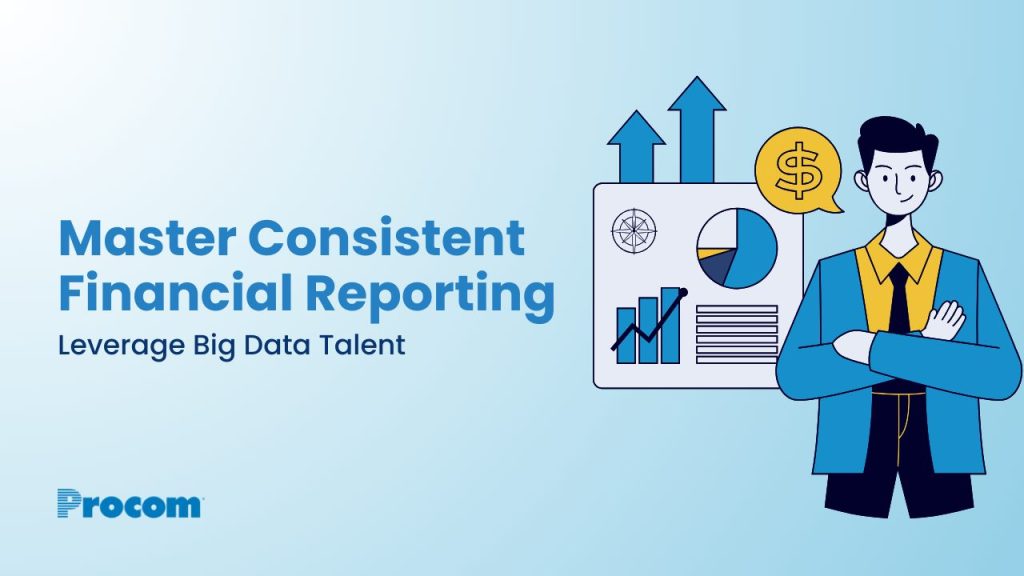With new compliance regulations as well as the adoption of automation across organizations today, consistent financial reporting is more critical than ever. The rise of Big Data in finance and the increasing complexity of financial transactions demand a proactive, data-driven approach.
Organizations must ensure transparency, accuracy, and compliance while navigating complex regulatory environments. By leveraging Big Data technologies and specialized IT talent, companies can transform their financial reporting processes—gaining a competitive edge and enhancing operational efficiency. Financial institutions must evolve with these technological advancements to remain trustworthy and relevant.
Give your company an industry advantage today with Procom and our specialized IT professionals! Hire IT Talent Today
Studies show that companies driven by analytics experience financial growth much faster than their less analytical peers. Industries like banking and capital markets, pharmaceuticals, insurance, and energy lead in analytics maturity, demonstrating that analyzing transaction data and market trends is now central to achieving superior financial performance.
To excel in consistent financial reporting, organizations must invest in the right talent. Data engineers, data scientists, visualization specialists, and machine-learning engineers are essential for effective collaboration and Big Data insights. Robust internal controls, GAAP compliance, and audit trails are also key to enhancing the accuracy and reliability of financial statements.

Key Takeaways:
- Consistent financial reporting is vital for maintaining transparency, accuracy, and compliance.
- Companies that utilized Big Data analytics report significantly higher growth than competitors.
- Investing in specialized IT talent, such as data engineers, data scientists, and machine-learning engineers, is key to uncovering actionable insights, and harnessing the power of Big Data in financial reporting.
- Establishing robust internal controls, ensuring GAAP compliance, and maintaining audit trails are essential best practices for achieving consistent and reliable financial statements.
- By mastering consistent financial reporting through Big Data talent, organizations can improve decision making processes and drive strategic planning.
The Importance of Consistent Financial Reporting in the Age of Big Data
As organizations increasingly rely on structured and unstructured data, consistent financial reporting is more critical than ever. It’s a key factor in maintaining transparency, accountability, and investor trust. Standardized practices allow companies to provide dependable data to stakeholders, making it easier to forecast future trends, evaluate risks, and enhance trust.
The move towards International Financial Reporting Standards (IFRS) has been a major step towards consistency. The IFRS Foundation is a not-for-profit responsible for developing global accounting and sustainability disclosure standards, known as IFRS Standards.
Though initial U.S. interest in IFRS waned between 2009–2014, many CFOs and financial advisors now see IFRS as a long-term solution for comparability with most seeing IFRS as the top choice, up from 44% before. The American Institute of Certified Public Accountants suggests a 3-5 year transition to IFRS, highlighting the need for smooth consistency and comparability.
Ensuring Transparency and Accountability
Accurate financial reporting reflects a company’s commitment to ethical governance and mitigates agency conflicts. It helps stakeholders evaluate business performance, detect risks, and identify growth opportunities. A consistent approach also makes it easier to benchmark across peers using financial metrics derived from structured data.
Transparent financial reporting lets stakeholders evaluate a company’s health and prospects. It helps spot risks and opportunities, guiding informed decisions. Consistency in financial reporting also makes comparisons easier, helping stakeholders track performance and trends.
Enhancing Investor Confidence and Market Integrity
Consistent financial reporting is also crucial for investor confidence. Reliable financial data helps investors make informed choices, promoting market integrity. This reduces information gaps, benefiting everyone.
IFRS adoption boosts a company’s appeal to foreign investors and capital markets. It makes raising capital easier, especially for Tourism, Hospitality, and Leisure (THL) sectors. Companies aligned with IFRS also gain easier access to capital markets—especially in sectors like financial services, hospitality, and energy—where global competitiveness is essential. This leads to better controls and smoother international deals.
Facilitating Informed Decision-Making
Consistent financial reporting aids in making informed decisions. Investors and lenders rely on consistent reports to make informed investment decisions. Disparities caused by data breaches or non-compliance can harm a company’s reputation and stall growth. Meanwhile, standardized data aids in real time data processing and real time analytics, offering deeper and more personalized services.
It also makes data integration and analysis efficient. Standardized data allows for seamless integration, offering real-time insights. This supports better decision-making, risk management, and planning.
Moreover, it’s key for legal and regulatory compliance. Non-compliance can lead to penalties, disputes, and damage to reputation. By following standards, companies avoid these risks and keep regulators’ trust.
Leverage analytics-ready talent to turn complex data into consistent, actionable financial reports with Procom’s Big Data Talent. Start your talent search now
Harnessing the Power of Big Data Analytics for Financial Reporting
Today, companies are increasingly relying on Big Data analytics to transform their financial reporting. They tap into vast amounts of data from various sources, allowing them to gain deep insights into their financial health, risk management, and compliance.
By tapping into Big Data environments, organizations can gather and analyze information from transactional data, market data, customer data, and alternative data sources. The goal being to obtain meaningful insights to strengthen risk, performance, and compliance frameworks.
Automating Data Collection and Validation
Big Data analytics offers a significant advantage in automating data collection and validation. Advanced tools and machine learning algorithms streamline data processing and automate validation across sources. Big Data analytics tools powered by artificial intelligence and deep learning models ensure consistency and integrity across platforms. These technologies also simplify the integration of sensitive financial data from various systems.
This ensures data consistency, accuracy, and comparability over time. Automation saves time, reduces errors, and enables real-time financial monitoring and compliance checks.
Identifying Patterns and Anomalies in Financial Data
Big Data analytics helps uncover hidden patterns, trends, and anomalies in financial data. Sophisticated algorithms enable fraud detection capabilities, identifying anomalies such as unusual transactions or fraudulent activities. This allows for timely intervention and improved internal controls (essential for credit risk assessment and safeguarding data protection regulations) which allows companies to act swiftly to protect their financial integrity.
Generating Real-Time Insights and Predictive Analytics
The combination of Big Data analytics and predictive modeling offers real-time insights and forecasts. Historical data, market trends, and external factors are analyzed to predict customer behavior and optimize resource allocation.
Big Data enables real time financial forecasting using historical market data, customer behaviour, and economic indicators. Companies can refine financial strategies, optimize portfolio performance, and enhance trading strategies to stay agile. This empowers decision-makers to make informed choices, adapt to market changes, and stay competitive.
Establishing Robust Internal Controls and Audit Trails
Robust internal controls are crucial for maintaining the integrity of financial data. These controls include segregation of duties, regular reviews, and approvals. They prevent errors and fraud. Strong internal controls are key to protecting financial outcomes and can reduce errors, discrepancies, and omissions by more than half. A comprehensive data analysis also allows organizations to track and validate each step of their financial operations. This makes it simpler to identify and rectify any issues that may arise.
Conducting Regular Reconciliations and Reviews
Regular reconciliations and reviews are critical for maintaining consistent financial reporting. Reconciliations help identify discrepancies between different financial records. This allows for timely resolution of any inconsistencies. Regular reviews enhance transparency and improve data management processes. Together, these practices support improved financial performance while meeting evolving complex regulatory requirements.
Some key benefits of regular reconciliations and reviews include:
- Reducing the risk of errors and discrepancies by up to 80%.
- Enhancing the accuracy and reliability of financial data.
- Facilitating timely detection and correction of any issues.
- Improving compliance with regulatory requirements.
By leveraging AI technologies and implementing these best practices, organizations can streamline their financial reporting processes. They can improve data quality and generate timely and accurate financial reports. These reports meet the needs of stakeholders in a dynamic business environment.
Partner with Procom to hire data experts who elevate your financial reporting and decision-making. Connect with our team
Consistent Financial Reporting: Hiring Top Big Data Talent
To ensure consistent financial reporting, organizations must hire top talent who can master financial reporting and require collaboration across functions. Big Data requires collaboration between financial analysts, engineers, and IT stakeholders to process and analyze diverse datasets and provide insights that inform strategic decisions. By doing so, organizations can make informed decisions, maintain investor confidence, and comply with regulatory requirements.

The integration of AI and Big Data analytics is transforming financial reporting. It automates data collection, validation, and analysis, offering real-time insights. These technologies help organizations produce high-quality financial reports. They meet the evolving needs of stakeholders. The AI-driven transformation enhances efficiency, transparency, and accountability. It strengthens market integrity and investor confidence.
The impact of AI and Big Data on financial reporting will grow. Organizations that adopt these technologies will gain a competitive edge, and they will thrive in the data-driven decision-making era.
The intersection of advanced technologies and talent is reshaping financial reporting. From enhancing data security to improving operational efficiency, organizations must adopt a data driven approach to stay ahead. With Procom as your partner in talent acquisition, you’ll gain access to professionals who empower enhancing decision making processes and deliver valuable insights to drive sustainable success.
Ensure audit-readiness, GAAP compliance, and real-time insights by hiring Procom’s top-tier data talent. Find your next hire
Stay Ahead of Market Data and Financial Strategies With Big Data Solutions Talent From Procom
A partner like Procom can connect your organization with professionals who have specialized skills and experience working with data analytics technologies in the financial industry. Whether you’re analyzing customer preferences, interpreting historical data, or building a Big Data infrastructure, having access to the right talent matters.
Through training and development programs, Procom ensures candidates are ready to meet your goals—whether you’re integrating data collected from multiple sources or deploying a powerful data visualization tool to improve reporting clarity.





